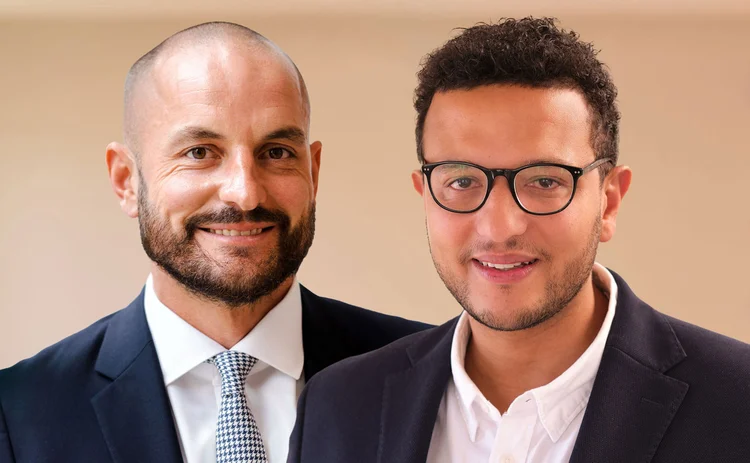Q&A: Aviva’s Ryan Birbeck and Michael Yabantu

Aviva’s Michael Yabantu, managing director of mid-market, and Ryan Birbeck, broker and client development director, sit down with Insurance Post to talk about the internal changes Aviva has made to make access easier for brokers, what product lines it hopes to explore over the next 12 months, and why the London Market is a “key area” for growth in 2024.
What do you want to be known for within your broker partners?
Yabantu, pictured right: Trust and service, which has been a hot topic over the last 12-18 months, if not longer as we’ve emerged out on Covid.
Those two points are really important for us.
But we see three things as the route to helping and supporting our brokers and to achieve our ambition.
Visibility, being more visible in the marketplace with our brokers and customers. Being more responsive, not just in terms of speed of turnaround, but the quality of the turnaround, and how we are bringing the best of our propositions and products more consistently. And finally, execution, so doing what we say we’re going to do, whether that’s for brokers, for customers, and internally, how we are joining up the end to end as well.
Do you feel you are where you want to be in achieving that?
Yabantu: We’ve got a good foundation. Our broker and client development team that spans the UK have provided a single face to market.
We’re across 20 geographies. That’s a mixture of physical branches, and where we’ve got virtual teams where we’ve kept a real presence in some local and distinct markets.
And then lots of capable client relationship managers, 103 risk surveyors, 42 risk management partners. We know that our proposition is broad, but with the breadth of proposition, how are we listening to the feedback that we’re getting from brokers in 2023? And what are the things that they are telling us that are really important?
That is definitely around simplifying how they access us; how can they access more of our products and the breadth of our propositions more consistently, but in a tailored way so we don’t throw 50 things at them.
What feedback have you received from brokers in order to feel that you needed this change?
Yabantu: Historically, one of the things brokers have talked about is how they often find it complicated when they’re trying to access Aviva.
What Dave [Martin] has done with this structure is given everybody really clear lines of accountability, and this is the next evolution of that.
We then follow that through down into the regions. So the big thing for us is, in every region where we operate, we’ll have underwriting, distribution, client and claims. So four people effectively making sure that all aspects of our proposition are covered, and brokers have got local access to all these things to make sure we’re showing up and delivering more consistently the best of our proposition.
How did it get so complicated?
Yabantu: The business has grown over the last three years. So, we’ve introduced new roles as our teams have grown.
We’ve always had a distribution function that services end to end. So they look after all aspects of the GI relationship that we have with brokers, whether that’s in personal lines, whether it’s digital, whether it’s schemes, they manage all of that end to end.
The big thing for us is, in every region where we operate, we’ll have underwriting, distribution, client and claims. So four people effectively making sure that all aspects of our proposition are covered, and brokers have got local access to all these things to make sure we’re showing up and delivering more consistently the best of our proposition.
Michael Yabantu
But of course, there’s a whole different multitude of brokers out there, from large to small. And you know, we’ve had different teams within that distribution function facing off to a variety of different brokers.
And then outside of that, every area has just grown and expanded, such as claim service managers, our client relationship managers etc. All of those roles have expanded, but then what we haven’t done is joined all of that up to say: ‘Brilliant, we’ve got all these new propositions and capabilities, how do we bring that together in a geography such as Manchester or London, or in a Birmingham in a really simple way for the brokers?’
Birbeck, pictured left: From the feedback that I’ve heard, from a distribution perspective, we stopped operating around geographies and looked at different raw segments and I think that just got confusing.
We’ve really tried to reverse that with these changes. We should do them together because there’s nothing more powerful than a distribution function and an underwriting function that can do things together for the broker.
If you are not working together, that’s where you get miscommunication, and you don’t get the best outcomes for customers. So our view is that, actually, we need to be more seamless in terms of how we align the business models, because we do have huge scale, and so to be more joined up will drive better outcomes for both our brokers and final customers.
Is it more of a focus on the geography now then, rather than the lines of business?
Yabantu: A bit of both, I think. We start with the geographies to make sure all of that breadth can be accessed everywhere. And then underneath that, it’s how do we make sure it’s fit for purpose.
One of the big changes we have made in the branch network is segregating new business and renewals
A lot of the feedback we had last year was: ‘We love trading with you, we want to grow our business with you. How do you give us better, faster, quicker responses on new business?’
So we can plug in some hungry traders that they’ve got access to, that are focused around new business, so we are still looking after the existing business book as well.
But we want to make sure all of that is accessed regionally and locally, rather than in a central place somewhere that’s miles away, because relationships are still really, really important to build.
Birbeck: Our model, from a distribution perspective, probably remains hopefully clear but unchanged, in the sense that we do offer that single view of UK GI irrespective of the line of business, the product or the distribution channel.
We don’t want to rest on our laurels. We want to continue to evolve. We definitely don’t want to be complacent.
If we’re going to achieve our ambitions, and we’ve got to work smarter. And the feedback that we’re getting is probably twofold is that they want our distribution teams and underwriters to be more joined up. And the other bit is around actually, the propositions that we do have, are we bringing the best of that to the customers and clients consistently? So that’s why we’re making the changes that we are.
How are you doing that?
Birbeck: Each chosen market or region has an aligned dedicated distribution team in that region, with its own dedicated claims relationship management and client relationship officers.
Now, we’ve gone a little bit further in London Market. We’ve actually brought the broker development and the client relationship management teams under a single leadership to give just one view of broker, customer and market in that space.
We do have ambitions to grow everywhere, but the London market is a key area for us. And we believe by having a single view like that, we could definitely drive key metrics by being more joined up across the different lines of business.
So that’s a big change that we’re making.
But in our chosen markets and regions, it is designed to ensure that across the core disciplines that actually what brokers tell us matters is that across claims distribution and underwriting, you’ve got a single team who are accountable for the relationships, understanding the growth opportunities, and making the most of them.
So what what is it specifically about the London Market that makes it a “key area” for you?
Birbeck: We’ve got a really broad underwriting appetite and product set. So if you look across corporate lines, financial lines and specialty lines, we pretty much represent a lot of the product lines that brokers talk about.
We have got specialist underwriting teams. Now, currently, we are very strong in UK corporates, and we want to look at how do we expand out of that space and do more specialty lines.
We’ve grown heavily in renewables and cyber, and so I think we see the opportunity to continue to be strong in the corporate lines, but there’s massive room for growth in financial lines and specialty lines. So now it is about identifying the additional products and distribution routes that might help us do that.
Would you look for acquisitions to branch out in specialty? Is book building an option?
Birbeck: From my perspective, we are very much targeted on delivering organic growth and continue to find ways to increase our penetration with the different brokers that operate in that space.
In growing the average product offering per customer, we have a client relationship management team that manages our larger clients, so they’re very much focused in that space.
If the business gives us a different distribution channel to work with, then that would be great, but our focus is absolutely on organic growth.
Gracechurch recently announced its results and Aviva was not given a claims marque. What still needs to happen across the end-to-end in order for you to be recognised next year?
Yabantu: It’s a variety of different things in different areas. So, if I look at underwriting, we’ve made all of the changes, all the teams are now in place. It’s now about execution.
We’ve settled things down, everybody knows the roles they are in and the jobs they are in.
We’ve created some new roles across the UK. So we’ve got underwriting managers, so there’ll be seven underwriting managers in each of the branches, and there are new roles that are designed to provide high levels of technical support, either to our teams or externally across the core classes.
So a number of those roles have been filled, but not all. We’ve got a couple of branch manager roles to fill, but the overall structure stuff is done.
And now the primary focus is now about execution: How do we get better at new business? Delivering a better appetite, delivering better service on renewals, more interactions, and improve the quality of our of our interactions as well?
Birbeck: It’s the same from a from a distribution perspective, we do have some we’ve done some recruitment. There are a couple of roles in my team that we’ll be looking to announced in the next couple of months.
In terms of people, we are just waiting for certain roles to join. It’s then getting on and making sure that we organise our teams and line our teams up to get them out to brokers so we increase that visibility, and they see the difference in terms of the responsiveness that we’re giving.
But then when it comes to the underwriting side, we have gone down that segmentation route and I think the signs are positive. We’re never in a place where it’s done. The culture of the business is always ‘how do we keep going?’ and I think that’s not going to stop.
I’d like to think that we keep giving these updates where we find a way to continuously improve. And we continue to talk about where we’re taking it even further.
I do think in claims, we have been quite candid, that there have been challenges. I think in claims we have seen a lot of issues that have come together at once, whether that be supply chain, whether that be weather. We acknowledge that.
We’ve got plans in place to increase resource, particularly in motor claims, which is where I would say we’ve had the most feedback. We acknowledge that it’s an industry wide problem, but we are focused on solving issues, recruitment being one, improving our processes being another.
Yabantu: We are trying to join up feedback and insight from claims, whether that’s around trends. What they’re seeing from an inflation perspective, what’s driving some of the impacts on service, whether that’s weather events, or otherwise, because that’s actually really important for our teams to understand and also brokers to understand.
So at least that insight that we’ve got, and the data we’ve got access to, and all the trends, we are trying to relay that back externally so brokers can at least be as well informed as they can be to make the best decisions for the clients.
So, Aviva’s commercial business grew 12% in 2022, and 2023 results are yet to come out, what would be a successful year for you looking to 2024?
Yabantu: There’s still going to be a lot of headwinds this year. So inflation isn’t going away, that’s still going to be a challenge. Supply chain is still a challenge. There are lots of things that are going to continue to be challenging.
For us, it’s a continuation of the results and the momentum from 2022 into 2023 and 2024. If we can maintain a similar performance while navigating those headwinds, and some of the changes we made deliberately are aligned to try and do that, then that would be a really successful year for us. Also, at the same time, the sentiment and feedback from brokers continues to improve as well.
It’s not just about delivering great financial results and returns to shareholders. It’s got to match externally with what our brokers and clients are saying about us as well.
Birbeck: We want to grow across commercial lines and personal lines, and my team needs to sort of facilitate that by connecting brokers to the right technical underwriters to get opportunities over the line.
For me, it’s about maintaining that positive trajectory that we’re on, I am optimistic about the opportunities, and optimistic about the fact that we have a business in the UK that is weathering a lot of challenges at the moment. And I’m confident that we have the sort of products, propositions whatever that might be to get the best out of that.
It’s not going to be easy, but I feel confident that we’re well placed to capitalise on the future growth.
You previously spoke about cyber being a key area in which you were looking to expand. How has that journey been? And are there any other areas in which in which you’re looking at?
Birbeck: Cyber is still a core growth area, nothing’s really changed in terms of sentiment the last time we spoke.
We have built out the team, so now there are regional leads to support brokers who operate regionally. We have also increased the London market team for more of that corporate business.
We have built out an excess of loss product. The market conditions meant some indemnity will be coming down in terms of the primary layer, so it was an opportunity to do more excess layer, which we’ve done.
And we’ve also launched the cyber respond product, which is aimed at SME customers. We’ve got plenty of claims resources risk management resource.
I think we definitely executed the plans that we said we would do. It is a competitive market, and it’s constantly evolving in terms of propositions and offerings. But I feel we’ve built out the core offering that we said we will do, and it’s just a case of getting on with it, so it has continued.
Yabantu: We’re definitely looking to expand in digital. So, the breadth of our offering through our digital channel. We definitely want to do more in schemes.
We have spoken about MGAs before. We don’t have the expertise in everything, so we’ll continue to explore that avenue.
Then in mid-market, we’re hoping to launch either later this year or early next year mid-market multinational.
We’re constantly looking at, in response to where brokers are saying, gaps or where could we improve our proposition. We try and take that feedback in and then prioritise based on the needs to either add to or evolve existing products, or deliver new products.
How have you adopted AI? And how is it streamlining the business?
Yabantu: We think of AI as a component part of technology more broadly, data and AI together. So, in mid-market in the regional business, we’ve been on this journey now for probably the last four or five years.
It is really about three things: how do we make it more efficient to trade with us? Are there more self-serve opportunities that we can give to brokers, through improving the technology?
Are there things that we can automate, either in our internal underwriting processes or end to end processes, that create capacity for our teams to then focus on the things that really matter to clients and brokers?
Then data: So, providing more data, more insight, more underwriting insight at the point of sale or point of decision for the underwriter to then make the best decision to the broker.
On things like under insurance, where we’re actually sharing the data with brokers externally to say: ‘look, we think there’s an opportunity to provide more coverage for the customer and give an improved outcome’.
We’ll continue to keep all of those aspects under review.
One of the things that we will hopefully through the course of this year and by the end of this year, on AI and automation is we’re very much focused on new business.
So, from a broker sending in a new business submission, how do we ingest it in an automated way and enrich it?
Could that have an impact on staff numbers?
Yabantu: The underwriter is still absolutely integral to that process. This isn’t about reducing the number of people we have. We delivered in mid-market just over 600 technical licence increases last year.
We want to deliver more empowerment, reduce the processing time that the underwriters have to focus on, so they can apply their technical and trading capability. And have it blended with the insight from how we automate and all of the enrichment.
So the quality and the frequency of our ‘yes’-es on our new business, or the quality of our decisions are improved.
It is an evolution of what we’ve done already in existing business. New business is the next phase for us, and if we can do that well, then it should stand in good stead externally.
Birbeck: Some of those embedded processes on existing business are still, from a broker perspective, pretty good.
Yabantu: Absolutely. In existing business, because of the automation, in excess of 85% of our renewals all go out within 28 days or before.
From a service perspective, it’s made a massive difference for us in making sure we’re out early, we’re talking to brokers, we’re engaging in good time to obviously allow them the conversations that negotiations well ahead of renewal.
Only users who have a paid subscription or are part of a corporate subscription are able to print or copy content.
To access these options, along with all other subscription benefits, please contact info@postonline.co.uk or view our subscription options here: http://subscriptions.postonline.co.uk/subscribe
You are currently unable to print this content. Please contact info@postonline.co.uk to find out more.
You are currently unable to copy this content. Please contact info@postonline.co.uk to find out more.
Copyright Infopro Digital Limited. All rights reserved.
You may share this content using our article tools. Printing this content is for the sole use of the Authorised User (named subscriber), as outlined in our terms and conditions - https://www.infopro-insight.com/terms-conditions/insight-subscriptions/
If you would like to purchase additional rights please email info@postonline.co.uk
Copyright Infopro Digital Limited. All rights reserved.
You may share this content using our article tools. Copying this content is for the sole use of the Authorised User (named subscriber), as outlined in our terms and conditions - https://www.infopro-insight.com/terms-conditions/insight-subscriptions/
If you would like to purchase additional rights please email info@postonline.co.uk
Most read
- Movers and shakers who made Insurance Post’s Power List 2024 revealed
- Has the Biba Conference shed its ‘Butlin’s for Brokers’ reputation?
- Toilet fraudster’s claim hits the fan








